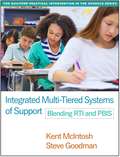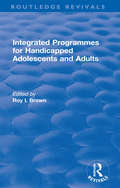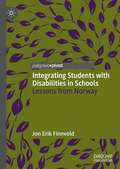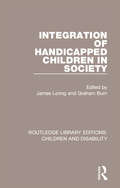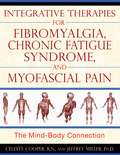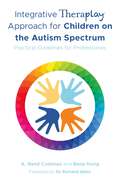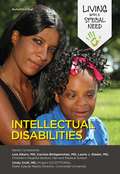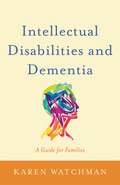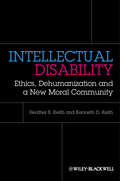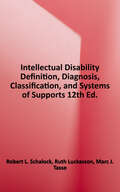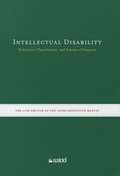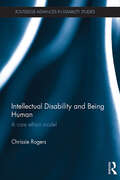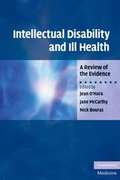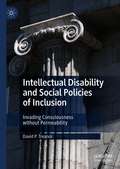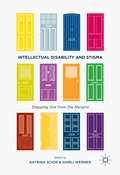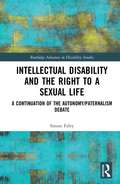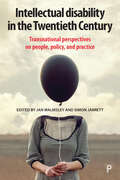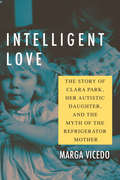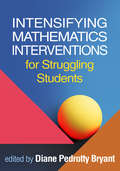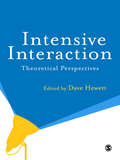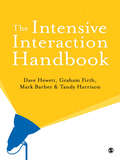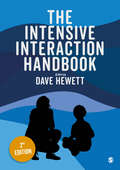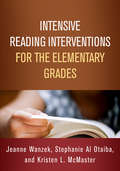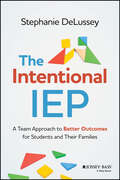- Table View
- List View
Integrated Multi-Tiered Systems Of Support: Blending Rti And Pbis (The Guilford Practical Intervention In The Schools)
by Kent McIntosh Steve GoodmanMany schools have implemented academic response to intervention (RTI) and schoolwide positive behavioral interventions and supports (PBIS) as separate initiatives. This book provides keys to making these programs more effective, seamless, efficient, and sustainable by combining them into a single multi-tiered system of support (MTSS). Steps and strategies are outlined for integrating data structures, practices, teams, and district systems. Contributing authors present detailed case examples of successful MTSS implementation in three states. In a large-size format with lay-flat binding, the book features 27 reproducible checklists and evaluation tools. Purchasers get access to a companion website where they can download and print the reproducible materials plus other helpful resources. <p><p> This book is in The Guilford Practical Intervention in the Schools Series, edited by T. Chris Riley-Tillman.
Integrated Programmes for Handicapped Adolescents and Adults
by Roy I. BrownFirst published in 1984, Integrated Programmes for Handicapped Adolescents and Adults explores the need to develop integrated programmes for adolescents and adults with developmental disabilities. Whilst the training models and concepts examined largely relate to formal areas of education, such as reading, mathematics, and writing, the book also pays close attention to social education skills, including home management, budgeting, meal preparation, and the development of positive familial relationships. Integrated Programmes for Handicapped Adolescents and Adults presents a number of projects from different parts of the world, with an emphasis on linking research and practice.
Integrating Students with Disabilities in Schools: Lessons from Norway
by Jon Erik FinnvoldThis book explores the ability of the Norwegian school system to support the achievement of formal competencies among children with physical disabilities, as well as its role in the informal dimensions of social participation and networking. Schools contribute to social inclusion in several ways: they are arenas for building official competencies, ensuring future access and success in the labour market. They are also sites for meeting other children, and developing friendships – friendships are not only important for strengthening cognitive development, but are vital to both good mental health and the building of various forms of social capital. By examining schools and the ways in which inclusion is incorporated early, this book aims to bridge the opportunity and employment gap that people with physical disabilities are more likely to face later in life.
Integration of Handicapped Children in Society (Routledge Library Editions: Children and Disability #9)
by James Loring Graham BurnFirst published in 1975, this book looks at the place of children with handicaps in society, at that time. It argues that in the thirty years previous, a great deal of progress was made in the field of rehabilitation but that the separation between handicapped people and the community was still a challenge. A strong range of contributors discuss approaches to the problem focusing on education, employment, and daily life. Topics covered include the social aspects of integration, through the problems of the multiple-handicapped child, to a survey of disabled students at universities and polytechnics in Great Britain.
Integrative Therapies for Fibromyalgia, Chronic Fatigue Syndrome, and Myofascial Pain
by Celeste Cooper Jeffrey MillerFibromyalgia, chronic myofascial pain, and chronic fatigue are often seen as interchangeable conditions, a belief held even by many health care providers. Nothing could be further from the truth--however, they do often coexist. Knowing if more than one of these disorders is present is extremely important, because the treatment for one of them can often exacerbate the problems caused by the others. Written by a registered nurse and a psychologist who has been treating these conditions since 1994, this book presents an integrative medical approach to these three disorders with a strong emphasis on utilizing and strengthening the mind-body connection to restore well-being. The authors begin with clear diagnostic guidelines for each condition and reference the latest scientific research on what causes these illnesses. Because many medical practitioners are relatively unfamiliar with these disorders, it can take several medical visits to arrive at a definitive diagnosis. Clear communication with medical personnel is key to diagnostic success. This book provides invaluable advice on how to describe symptoms, document health history, and keep a log of medical appointments. Included are interactive worksheets to facilitate these activities. The authors provide a thorough guide to numerous treatment options--from diet, exercise, and herbs to mindfulness meditation, yoga, and nonsteroidal anti-inflammatory drugs (NSAIDs). They also offer techniques to dispel the "brain fog" that these illnesses can create, offer guidance on the psychological issues that accompany these chronic pain disorders, and provide advice on how to build a personal support team. The final chapter gives advice on how to navigate the health care system, including step-by-step instructions for preparing an application to the Social Security Administration for disability benefits. An extensive resource section provides a wealth of contact information for helpful agencies and organizations, good sources for medical supplies, and a wide selection of suggested further reading. In short, this integrative treatment guide will open the door not only to physical recovery but also to emotional, mental, and spiritual well-being. CELESTE COOPER, R.N., worked as a nurse and nurse educator for more than 20 years before being diagnosed with fibromyalgia, chronic myofascial pain, and chronic fatigue syndrome. She is now an advocate for sufferers of these disorders and lives in Missouri and Arizona. JEFFREY MILLER, Ph.D., is a psychologist specializing in chronic illness from a spiritual perspective. He lives in Missouri.
Integrative Theraplay® Approach for Children on the Autism Spectrum: Practical Guidelines for Professionals (Theraplay® Books & Resources)
by A. Rand Coleman Rana HongCommunication and social skills are a key challenge for children on the autism spectrum, and a fundamental priority for care professionals to support their clients' progress. Using case studies and evidence-based advice, this book guides readers through an integrated Theraplay® approach to helping young people on the autism spectrum. The interventions emphasise interactivity and fun to help children build social and emotional skills through play. From using balloons to encourage eye contact to turn-taking play for fostering social awareness, each Theraplay® activity is tailored to support children on the autism spectrum and includes suggestions for further adaptations to suit each child's unique needs. Parents' and guardians' needs are also addressed in the context of Theraplay®, examining common sources of frustration and providing advice on effective treatment plans. Officially supported by the Theraplay® Institute, this handbook guides readers towards a thoughtful, focused application of Theraplay® to support children on the autism spectrum.
Intellectual Disabilities
by Autumn LibalNew parents who find out they're going to have a child with intellectual challenges are faced with many questions: Will she be able to function in the world? Will she have the same hopes and dreams as other children? Will her life be happy--or filled with sadness and failure? Along with the Brown family, you'll discover the answers to these questions as you read the story of Penelope Brown, a girl with Down syndrome. You'll see Penelope struggle to overcome others' ignorance and prejudice--and you'll watch her as she learns to follow her dreams.
Intellectual Disabilities and Dementia: A Guide for Families
by Karen WatchmanDrawing on the author's first-hand experiences with families, this book provides crucial, accessible information and answers the difficult questions that often arise when a family member with an intellectual disability is diagnosed with dementia. Linking directly to policy and practice in both dementia and intellectual disability care, this book takes an outcome-focussed approach to support short, medium and long-term planning. With a particular emphasis on communication, the author seeks to ensure that families and organisations are able to converse effectively about a relative's health and care. The book looks at how to recognise when changes in the health of a relative with an intellectual disability could indicate the onset of dementia, as well as addressing common concerns surrounding living situations, medication and care plans. Each chapter is structured to identify strategies for support whilst working towards outcomes identified by families as dementia progresses.
Intellectual Disability
by Heather Keith Kenneth D. KeithIntellectual Disability: Ethics, Dehumanization, and a New Moral Community presents an interdisciplinary exploration of the roots and evolution of the dehumanization of people with intellectual disabilities.Examines the roots of disability ethics from a psychological, philosophical, and educational perspectivePresents a coherent, sustained moral perspective in examining the historical dehumanization of people with diminished cognitive abilitiesIncludes a series of narratives and case descriptions to illustrate argumentsReveals the importance of an interdisciplinary understanding of the social construction of intellectual disability
Intellectual Disability: Definition, Diagnosis, Classification, and Systems of Supports
by Robert L. Schalock Ruth Luckasson Marc J. TasseThe AAIDD Manual leads the field in understanding, diagnosing, and classifying the construct of intellectual disability (ID). The 12th edition integrates the findings and developments of the last 10 years and presents the operational definition in a systematic approach to diagnosis, optional subgroup classification, and planning of systems of support for people with ID. In addition, the 12th edition examines the construct of the age of onset in light of the developments of the last 10 years and changes that criterion in a way that will be critically important for professionals in the field. The material in the 12th edition is presented in a user-friendly fashion and includes advance organizers for each chapter to facilitate easy access and understanding.
Intellectual Disability: Definition, Classification, and Systems of Supports (Eleventh Edition)
by The AAIDD Ad Hoc Committee on Terminology ClassificationThis Manual contains the most current and authoritative information and knowledge on intellectual disability, including best practice guidelines on diagnosing and classifying intellectual disability and developing a system of supports for people living with an intellectual disability.
Intellectual Disability and Being Human: A Care Ethics Model (Routledge Advances in Disability Studies)
by Chrissie RogersIntellectual disability is often overlooked within mainstream disability studies, and theories developed about disability and physical impairment may not always be appropriate when thinking about intellectual (or learning) disability. This pioneering book, in considering intellectually disabled people's lives, sets out a care ethics model of disability that outlines the emotional caring sphere, where love and care are psycho-socially questioned, the practical caring sphere, where day-to-day care is carried out, and the socio-political caring sphere, where social intolerance and aversion to difficult differences are addressed. It does so by discussing issue-based everyday life, such as family, relationships, media representations and education, in an evocative and creative manner. This book draws from an understanding of how intellectual disability is represented in all forms of media, a feminist ethics of care, and capabilities, as well as other theories, to provide a critique and alternative to the social model of disability as well as illuminate care-less spaces that inhabit all the caring spheres. The first two chapters of the book provide an overview of intellectual disability, the debates surrounding disability, and outline the model. Having begun to develop an innovative theoretical framework for understanding intellectual disability and being human, the book then moves onto empirical and narrative driven issue-based chapters. The following chapters build on the emergent framework and discuss the application of particular theories in three different substantive areas: education, mothering and sexual politics. The concluding remarks draw together the common themes across the applied chapters and link them to the overarching theoretical framework. An important read for all those studying and researching intellectual or learning disability, this book will be an essential resource in sociology, philosophy, criminology (law), social work, education and nursing in particular.
Intellectual Disability and Ill Health
by Jean O'Hara Jane Mccarthy Nick BourasPeople with intellectual disability often have health needs that go unrecognised and untreated; this may be because of difficulties in communication, diagnostic overshadowing, discrimination or indifference. There is concern that public health measures aimed at reducing the main health killers in the population will not address these issues for people with intellectual disability and may preferentially widen the inequality that already exists. This book is a comprehensive and systematic review of physical and mental health co-morbidities in people with intellectual disability. Such an evidence base is vital in shaping public health policy, healthcare commissioning and the development of more effective healthcare systems, as well as supporting better understanding and practice at an individual clinical level. This is essential reading for policy makers and commissioners of services, as well as individual practitioners across mainstream and specialist health and social care, in considering not only service developments but practice at the coalface.
Intellectual Disability and Social Policies of Inclusion: Invading Consciousness without Permeability
by David P. TreanorThis book explores why, after forty years of funded policies of social inclusion, persons living with an intellectual disability are still separated from the social fabric of neoliberal societies. David Treanor shows how the nature of the reform process is driven unnecessarily by the economic neoliberal paradigm, the cultural misconceptions of intellectual disability, and the inattention accorded to personal relationships between persons living with and without an intellectual disability. Treanor utilizes John Macmurray’s personalist philosophy, Julia Kristeva’s ontology of disability and Michele Foucault’s concept of bio-power to explain this phenomenon. The concepts in this book challenge current approaches to social inclusion and have radical implications for future practices.
Intellectual Disability and Stigma
by Shirli Werner Katrina SciorThis book examines how intellectual disability is affected by stigma and how this stigma has developed. Around two per cent of the world's population have an intellectual disability but their low visibility in many places bears witness to their continuing exclusion from society. This prejudice has an impact on the family of those with an intellectual disability as well as the individual themselves and affects the well-being and life chances of all those involved. This book provides a framework for tackling intellectual disability stigma in institutional processes, media representations and other, less overt, settings. It also highlights the anti-stigma interventions which are already in place and the central role that self-advocacy must play.
Intellectual Disability and the Right to a Sexual Life: A Continuation of the Autonomy/Paternalism Debate (Routledge Advances in Disability Studies)
by Simon FoleyOne of the perennial political/philosophical questions concerns whether it is ever justifiable for a third party to paternalistically restrict an adult’s freedom to ensure their own, or society’s, best interests are protected. Wherever one stands on this debate it remains the case that, unlike their non-impaired contemporaries, many intellectually disabled adults are subjected to a paternalistic regime of care. This is particularly the case regarding members of this population exercising more control of their sexuality. Utilizing rare empirical data, Foucault's theory of power and Kristeva’s concept of abjection, this work shows that many non-disabled people – including family members – hold ambivalent attitudes towards people with visible disabilities expressing their sexuality. Through a careful examination of the autonomy/paternalism debate this is the first book to provide an original, provocative and philosophically compelling analysis to argue that where necessary, facilitated sex with prostitutes should be included as part of a new regime of care to ensure that sexual needs are met. Intellectual Disability and the Right to a Sexual Life is essential reading for scholars, students and policy-makers with an interest in philosophy, sociology, political theory, social work, disability studies and sex studies. It will also be of interest to anybody who is a parent or a sibling of an adult with an intellectual disability and those with an interest in human rights and disability more generally.
Intellectual Disability in the Twentieth Century: Transnational Perspectives on People, Policy, and Practice
by Jan Walmsley and Simon JarrettWith contributions from distinguished authors in 14 countries across 5 continents, this book provides a unique transnational perspective on intellectual disability in the twentieth century. Each chapter outlines different policies and practices, and details real-life accounts from those living with intellectual disabilities to illustrate their impact of policies and practices on these people and their families. Bringing together accounts of how intellectual disability was viewed, managed and experienced in countries across the globe, the book examines the origins and nature of contemporary attitudes, policy and practice and sheds light on the challenges of implementing the UN Convention on the Rights of Persons with Disabilities (UNCPRD).
Intelligent Love: The Story of Clara Park, Her Autistic Daughter, and the Myth of the Refrigerator Mother
by Marga VicedoHow one mother challenged the medical establishment and misconceptions about autistic children and their parentsIn the early 1960s, Massachusetts writer and homemaker Clara Park and her husband took their 3-year-old daughter, Jessy, to a specialist after noticing that she avoided connection with others. Following the conventional wisdom of the time, the psychiatrist diagnosed Jessy with autism and blamed Clara for Jessy's isolation. Experts claimed Clara was the prototypical "refrigerator mother," a cold, intellectual parent who starved her children of the natural affection they needed to develop properly. Refusing to accept this, Clara decided to document her daughter's behaviors and the family's engagement with her. In 1967, she published her groundbreaking memoir challenging the refrigerator mother theory and carefully documenting Jessy's development. Clara's insights and advocacy encouraged other parents to seek education and support for their autistic children. Meanwhile, Jessy would work hard to expand her mother's world, and ours.Drawing on previously unexamined archival sources and firsthand interviews, science historian Marga Vicedo illuminates the story of how Clara Park and other parents fought against medical and popular attitudes toward autism while presenting a rich account of major scientific developments in the history of autism in the US. Intelligent Love is a fierce defense of a mother's right to love intelligently, the value of parents' firsthand knowledge about their children, and an individual's right to be valued by society.
Intensifying Mathematics Interventions for Struggling Students (The Guilford Series on Intensive Instruction)
by Diane Pedrotty BryantThis key resource for K–12 educators offers a systematic guide to delivering Tier 2 and 3 math interventions within a multi-tiered system of support. The volume explains critical math areas in which many students have difficulty--early numeracy, time and money measurement, number combinations, fractions, word-problem solving, algebra, and more. Leading experts describe relevant standards and show how to use data-based individualization to plan, monitor, and intensify instruction in each area. Beginning with bulleted guiding questions, chapters feature a wealth of evidence-based intervention strategies, lesson-planning ideas, and case examples. Reproducible instructional activities and planning forms can be downloaded and printed in a convenient 8 1/2" x 11" size.
Intensive Interaction: Theoretical Perspectives
by Dave HewettIntensive Interaction is an approach to teaching the fundamentals of communication to children and adults who have severe learning difficulties or autism, and who are still at an early stage of communication development. Its simplicity and effectiveness has been one of the major themes in the widespread practitioner dissemination that has taken place during the last twenty years. Despite the human simplicity of the approach, intensive interaction relates to, or is influenced in practice by, a wide range of interconnecting theories and academic standpoints. With contributions from leading authorities, Dave Hewett provides a comprehensive and detailed description of the theoretical landscape of a now established methodology. The most prominent related theories and issues are reviewed, with Intensive Interaction set within their contexts. Issues covered include: - the approach within education and the curriculum - intensive interaction within adult services - effects on organisational change and development - neurology and learning outcomes - intensive Interaction and the Central Triad of autism - emotional learning and development outcomes - adoption of Intensive Interaction Providing a timely theoretical and academic overview to Intensive Interaction practice, this book marks a substantial theoretical waypoint to future development of interactive approaches generally. It is a vital resource of in-depth knowledge for anyone studying Special Educational Needs and Education. Dave Hewett is an independent educational consultant and has published widely on Intensive Interaction since his role in its development.
The Intensive Interaction Handbook
by Mark Barber Tandy Harrison Mr Dave Hewett Graham FirthIntensive interaction is an approach to teaching the pre-speech fundamentals of communication to children and adults who have severe learning difficulties or autism, and who are still at an early stage of communication development. This book is a practical guide to help those wishing to implement intensive interaction in their setting, and it provides detailed advice and step-by-step guidance as well as a consideration of all the issues associated with carrying out this approach. It considers: - preparing for intensive interaction - observing intensive interaction in progress - doing intensive interaction at home and at work - teamwork - wellbeing - record-keeping This book is a straightforward guide for anyone wanting to use intensive interaction with people with severe and complex learning difficulties, people who have very severe learning difficulties, profound and multiple learning difficulties, multi-sensory impairments, and people who have a diagnosis of autism.
The Intensive Interaction Handbook
by Dave HewettThe only guide you need to read on the Intensive Interaction approach returns for its second edition, this time with its founder, Dave Hewett, as the Editor. The Intensive Interaction approach has spread around the world and has been hugely influential in developing and teaching communication techniques with individuals who have severe learning difficulties and autism. This straightforward, no-nonsense handbook contains: - 2 new chapters: The Intensive Interaction Outcomes Reporter; and Autism and Intensive & Intensive Interaction and more able people; - photo stories demonstrating the approach in practice; - links to external videos presenting the photo stories in greater depth. More information on the Intensive Interaction community and approach can be found on dedicated social media pages, and at https://www.intensiveinteraction.org/
The Intensive Interaction Handbook
by Dave HewettThe only guide you need to read on the Intensive Interaction approach returns for its second edition, this time with its founder, Dave Hewett, as the Editor. The Intensive Interaction approach has spread around the world and has been hugely influential in developing and teaching communication techniques with individuals who have severe learning difficulties and autism. This straightforward, no-nonsense handbook contains: - 2 new chapters: The Intensive Interaction Outcomes Reporter; and Autism and Intensive & Intensive Interaction and more able people; - photo stories demonstrating the approach in practice; - links to external videos presenting the photo stories in greater depth. More information on the Intensive Interaction community and approach can be found on dedicated social media pages, and at https://www.intensiveinteraction.org/
Intensive Reading Interventions for the Elementary Grades (The Guilford Series on Intensive Instruction)
by Jeanne Wanzek Stephanie Al Otaiba Kristen L. McMasterPacked with easy-to-use tools and resources, this book presents intensive intervention strategies for K–5 students with severe and persistent reading difficulties. Filling a key need, the authors describe specific ways to further intensify instruction when students continue to struggle. Chapters address all the fundamental components of reading--phonological awareness, phonics and word recognition, reading fluency, oral language, language and reading comprehension, and writing to read. The authors discuss the design and implementation of intensive instruction and provide effective teaching techniques and activities. Grounded in the principles of data-based individualization, the book includes concrete recommendations for determining students' particular needs and monitoring their progress.
The Intentional IEP: A Team Approach to Better Outcomes for Students and Their Families
by Stephanie DeLusseyLearn how to put together IEPs with the power to make a real difference for students The Intentional IEP shows special education teachers how to successfully collaborate with all stakeholders—parents or guardians, general ed teachers, therapists, and beyond—to work toward students’ success. Too many of us aren’t trained to write the Individualized Education Programs that help millions of students with thrive in school. This book fills that training gap, explaining the importance of assembling an IEP team and inviting this team to confront and improve its current processes and habits to make IEP writing simpler and more effective. With all the pressures that educators are under, it’s easy to cut corners when it comes time towrite IEPs. Writing them in isolation, leaving them to the night before, making decisions without consulting data and research, letting family collaboration fall to the wayside—most special educators have made these mistakes at some point. The Intentional IEP equips you with the resources you need to feel confident in approaching IEPs the right way, including prioritizing the many competing demands you face so you can find the capacity to show up for your students. This book offers: Clear, step-by-step solutions for all IEP members that can easily be implemented at any time during the school year Collaboration strategies for IEP teammates to rely on one another for expert and professional knowledge Tools and reproducibles to strengthen practices and overcome common hurdles Direct advice from a veteran special education teacher who has seen what a difference collaboration in the IEP can make for studentsThe Intentional IEP is a timely resource for special education teachers, general education teachers, and support staff, as well as teachertraining programs. Parents and guardians with students will also benefit from this clearly written guide to the IEP.
